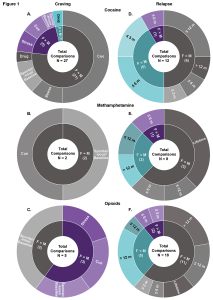 Reviews To Read – January 18, 2022.
Reviews To Read – January 18, 2022.
This systematic review summarizes clinical and preclinical studies on sex differences in psychostimulant and opioid craving and relapse. The results of the clinical studies reviewed do not appear to support the notion that women are more vulnerable to psychostimulant and opioid craving and relapse. The results of the preclinical studies reviewed provide evidence for sex differences in stress-induced reinstatement and incubation of cocaine craving, but not cue- or cocaine-induced reinstatement of cocaine seeking. These sex differences are modulated in part by ovarian hormones. In contrast, the available data do not support the notion of sex differences in craving and relapse/reinstatement for methamphetamine or opioids in rodent models.
Sex Differences in Opioid and Psychostimulant Craving and Relapse: A Critical Review Journal Article
In: Pharmacol Rev, vol. 74, no. 1, pp. 119–140, 2022, ISSN: 1521-0081.
